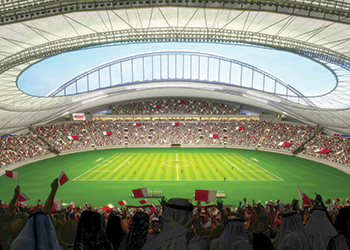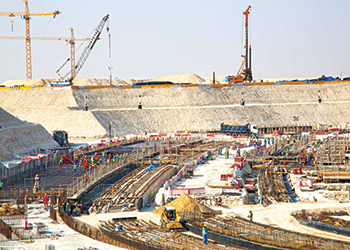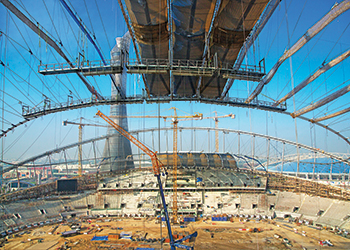Bang on target
01 March 2017
Work on Qatar’s Fifa World Cup stadia is well on track, as Gulf Construction finds out.
A total of eight stadiums, which will host the first Fifa World Cup in the Middle East, are under construction in Qatar with just under 10,000 workers on site at any given time. The number of workers is expected to more than triple this year peaking to 36,000 as various projects approach completion or the main works stage.
All eight stadiums will also feature innovative cooling technology.
A major renovation of the Khalifa International Stadium is nearly complete, while the Al Wakrah, Al Bayt and Qatar Foundation stadiums are rapidly heading towards their completion dates – the first two in 2018, and the last in 2019. The eight stadiums are located relatively close to each other – the longest distance fans would have to travel would be 56 km – between Al Bayt-Al Khor City in the North and Al Wakrah in the south.
The Supreme Committee for Delivery & Legacy (SC) is delivering the infrastructure and stadiums to host matches during the 2022 Fifa World Cup Qatar.
“A great effort has gone into building stadiums that will have a clear legacy use in years to come. These efforts have focused not only on the stadiums but also on the precincts, which will include a number of services and green areas,” says an SC spokesman.
After the tournament, the SC will donate the upper tiers of modular stadiums and the cooling systems to developing nations, to support the development of the game around the world.
 |
Artist’s impression of Khalifa International Stadium. |
Khalifa International
Renovation work on the Khalifa International Stadium at Aspire Zone, located 5 km west of Doha, is due for completion this month. It was originally built as a 20,000-seater stadium in 1976 and was refurbished for the 2006 Asian Games.
The contract for the comprehensive refurbishment works, which included adding a new building to the east wing and installing a single roof over the entire seating area, was awarded to joint venture of Midmac Contracting and Sixconstruct Qatar (a subsidiary of the Belgian Besix Group). Dar Al Handasah and Projacs are the design and project management consultants respectively. The project is due for completion in Q2 2017.
Khalifa International Stadium, which will seat 40,000 spectators, is the proposed host venue for group stage, round of 16 and quarter-final matches of the World Cup. It will also host the 2019 IAAF World Athletics Championships.
The stadium will host a range of new facilities including corporate hospitality suites, restaurants and the 3-2-1 Qatar Olympic and Sports Museum.
Al Wakrah
Superstructure works are now under way on this striking stadium designed by the late Zaha Hadid, who drew her inspiration for it from a traditional dhow.
This stadium is located 15 km south of Doha in Al Wakrah, one of Qatar’s oldest towns. The main construction contract was awarded to a joint venture of Midmac and Porr Qatar in December 2015. The stadium is expected to be completed by end-2018.
The precinct surrounding the stadium will have pedestrian outdoor spaces, a school, wedding hall, multipurpose indoor arena, and retail spaces.
The venue, which will host quarter-final matches, will have a capacity for 40,000, reduced to 20,000 in legacy mode.
 |
Construction advances on Al Bayt Stadium. |
Al Bayt – Al Khor City
Construction at the 60,000-seat Al Bayt – Al Khor City Stadium, which is designed like a traditional Arabian tent, is now in full swing with the commencement of installation of the first fix of approximately 2,500 modular seating sections at the north stand of the stadium. Work on the project is being undertaken by a joint venture of Galfar Al Misnad, Salini Impregilo Group and Cimolai. Dar Al Handasah is the design consultant and Projacs, the project manager.
The stands of the stadium are now visible from afar reaching a height of 39 m from ground level. The steel structure platforms for the modular seats are designed in Germany and manufactured in Italy, while the actual seats are designed and manufactured in Qatar.
Located in Al Khor, 35 km north of Doha, the stadium will host the group, quarter-final and semi-final matches. The design draws on the Bayt Al Sha’ar Bedouin tent for inspiration. The design includes an upper tier of removable seats, which will reduce its capacity to 32,000.
Work is in full swing following the completion of the foundations and the installation of the first sections of the 12-m lower tier walls, which will carry the weight of the entire stadium structure. The stadium will feature a futuristic retractable roof with mechanics similar to those used at Wimbledon’s Centre Court. The roof will be able to close completely in 20 minutes.
Dr Nasser Al Hajeri, Al Bayt Stadium project director – Aspire Zone Foundation, says: “We are now seeing the growth of the main stadium structure on site with the vertical construction in progress.”
Other ongoing works in the stadium precinct include excavation, dewatering, installation of pipe connections and the recent setting up of a tree nursery.
A number of the stadium building columns have been put in place, along with a section of the buttress wall which, once completed, will carry the next two levels of the structure reaching a total of 37 m. Additionally, the first player tunnel works are complete and now open.
Currently, there are 21 cranes on site, including a 280-tonne mega crane. The next step in the construction is placing the top slab and installing the other precast elements which will shape up the venue. With the stadium expected to be ready in 2018, samples of the seats that will fill the stadium have already arrived on site.
Facilities at Al Bayt will include a multi-purpose area in the upper concourse of the stadium, horse-riding, cycling and jogging tracks, and retail spaces.
Qatar Foundation Stadium
A consortium led by Cyprus-based contractor Joannou and Paraskevaides (J&P) is the main contractor for the Qatar Foundation Stadium. Casting of the first two working piles have been completed as has excavation to pitch level. The project is expected to be completed in 2019.
The stadium is located in the Education City in Doha, home of Qatar Foundation and will have a capacity of 40,000 seats, later reduced to 25,000 seats in legacy mode. Its design resembles a diamond in the desert and will feature geometric patterns that appear to change colour as the sun arcs across the sky. It is the proposed venue up to quarter-final matches.
The stadium will become a sports, leisure and social hub after 2022 and the precinct surrounding it will include gymnasiums, upper-tier athletics track, Olympic-sized pool, and tennis courts.
Al Rayyan Stadium
Located 20 km west of Doha, Al Rayyan Stadium is being built on the site of Al Rayyan Sports Club’s former stadium (Ahmed Bin Ali Stadium), which was demolished to make way for the new venue. It will have 40,000 seats during tournament, reduced to 21,000 in legacy mode and is the venue up to the quarter-finals.
A joint venture of Qatar’s Al Balagh Trading & Contracting and India’s Larsen & Toubro Limited (L&T) are the main contractors for the stadium, which is expected to be completed in 2019.
Al Rayyan’s façade is formed from seven patterns, representing different aspects of Qatari culture. The stadium is designed with the goal of certification under both the Global Sustainability Assessment System (GSAS) and Leadership in Energy and Environmental Design (Leed). Its precinct will include a mosque, aquatics centre, athletics track, cricket pitch, tennis courts and hockey pitch.
Last October, the first concrete was poured at the stadium’s West stand five weeks ahead of schedule, and the superstructure is set to be completed in 2018.
Lusail Stadium
A joint venture of Qatar’s HBK Contracting (HBK) and China Railway Construction Corporation (CRCC) is the main contractor for the Lusail Stadium.
Britain’s Foster + Partners has completed schematic designs of the 80,000-seater stadium, which are expected to be released this year. Located in Lusail City just 20 km north of Doha, it is scheduled for completion by 2020 and will host the opening and final matches.
Early works and site office construction projects were completed by Galfar Al Misnad, with levelling and grading works and site and access roads completed by Marbu Contracting. Design and mobilisation activities are in progress.
Ras Abu Aboud
The final design for this stadium has already been finalised and approved and will be unveiled this year. Demolition works commenced last April and bids have been called for the main contract. Global architecture firm Populous is the design consultant for the venue and TiME Qatar, the project manager.
The venue at Ras Abu Aboud will enjoy an exceptional waterfront location visible from West Bay. The 450,000-sq-m site, located near Hamad International Airport, will include 6,000 car-parking spaces during the tournament and 2,000 in legacy mode.
Work on the 40,000-capacity stadium is scheduled for completion in 2019.
Al Thumama
Arab Engineering Bureau (AEB) is design consultant for this proposed venue in Al Thumama neighbourhood. The main contractor is a joint venture between Qatar’s Al Jaber Engineering and Turkey’s Tekfen Construction, and the final design revealed later this year.
The stadium will have at least 40,000 seats and will host matches for the quarter-finals stage. In legacy mode, its capacity will be reduced to a maximum of 20,000 seats. The expected date of completion of works is 2020.
Other facilities
There will be training sites for World Cup teams, procured through a rollout plan to maximise the contribution of local private sector and small to medium enterprises. The sites will offer legacy opportunities such as public spaces and facilities for schools and will be transformed into greenhouses for food security.
The SC has taken steps to improve the welfare of workers, with independent London consultancy Impactt monitoring their wellbeing in line with Edition 2 of the Workers Welfare standards on 2022 Fifa construction sites.
The SC has also signed an agreement with Building and Wood Workers’ International (BWI), a global trade union for construction workers, which will see them conduct joint labour and accommodation inspections on the stadiums from this year.
- Partners in progress
- Qatar projects at a glance
- Bang on target
- Hats off to SC!
- Reynaers delivers bespoke solution
- Mapei cashes in on business boom
- Jotun scores with World Cup win



